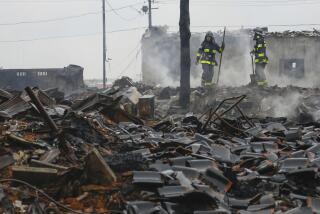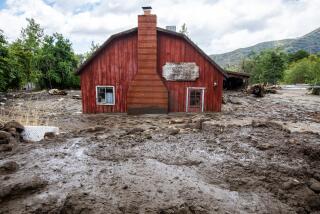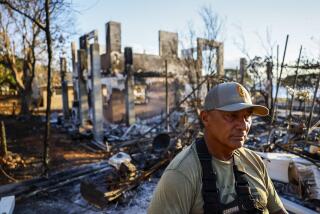Volunteers’ Skills Aid in Search for Tsunami Victims
- Share via
The French words on one tsunami website felt like a stab through Mary Duffy’s heart: “We’re waiting for news of you. Please contact Mom and Dad.”
When Duffy, 51, a retired Internet specialist from the Silicon Valley, pictured the desperate French parents looking for their daughter, missing in the disaster in south Asia, she realized that donating money to tsunami relief efforts was not enough.
In French, Duffy wrote to them: She wanted to help them search.
And so began her tireless effort over the last week to help people who do not speak English or are not Internet savvy find out whether their loved ones were dead or alive.
“I imagined myself or my sister missing, and my parents not knowing what to do,” Duffy said. “It got to me. I never felt that way before .... That’s how it started.”
Across California and the country, people who do not know anyone caught in the tsunami are offering linguistic, computer and research skills to help others search.
Some have combed more than 30 victim-tracking websites, linking postings and names that might be related. Others have called hospitals and friends in the affected countries. Still others have created websites and posted photos and descriptions of the missing. One posted this message: “I have tons of free time. Love to do something to help if you need extra set of fingers.”
There is plenty to do. The State Department estimated Monday that nearly 4,000 Americans remain unaccounted for throughout the Indian Ocean nations affected by the tsunamis, which killed 150,000 people in 12 countries, according to the latest estimate from the United Nations.
Secretary of State Colin Powell said Monday he expected that figure to go down as travelers check in with families.
South Africa, Australia, Germany, Sweden and Switzerland lead the nations outside the region with citizens confirmed as missing in tsunami-affected areas, or still unaccounted for. Each country listed more than 1,000.
From her Santa Clara Valley home, Duffy has spent every morning and evening of the last week studying websites and consoling families who seem to be giving up hope. At any time, she said, she has 30 site windows open on her computer screen.
Last week, Duffy replied to this message from Bitsa Burger in Guerneville, Calif.: “Still seeking ANY info on Mary & Jerry DeVries, their 2 children & parents. My contact info was left out before. PLEASE CALL ... I MUST find out if they’re OK.”
The last that Burger had heard from the family was through a Christmas card describing their travels in Phuket, Thailand. Since news of the tsunamis, she had been e-mailing with Duffy regularly.
On Monday at 4:53 p.m., Burger e-mailed Duffy to tell her that the family, who live in Japan but were vacationing in Thailand, had been located and everyone was safe.
“Good news is still coming,” Duffy said.
Reached Monday by phone at home, Burger said that when Duffy first replied to her listing, offering website links, hospitals and possible name matches, “I was so excited to get something.”
“I don’t know who she is,” Burger continued. “She’s helping me search because my research skills don’t seem very good right now.”
As for the French parents who sparked Duffy’s efforts, they found their daughter on their own, days later. But at least five other families whom Duffy is helping are still waiting for news.
A European woman who is searching for her best friend “is actually looking at me like a lifeline right now,” Duffy said. “We’ve been e-mailing 24 hours a day. She’s not sleeping. The family is giving up.”
Duffy has interviewed people who returned from Thailand, trying to find clues about the missing friend. She learned that the village where the friend was staying was “completely wiped away.” Still, Duffy is trying to comfort the woman searching.
Scott Powell, 42, a Web designer in Tacoma, Wash., is helping families download photos and post them on the Internet. Powell, who is trying to launch his own business, could not help financially, but he decided to offer his Internet skills because “my family and I have just been heartbroken,” he said. “It’s horrendous. I’ve never seen anything like this.”
Powell said he just wanted to “help in some small way.”
Mickey Drgon, a Thousand Oaks native who now lives in south Florida, could not sit idle either.
“You’ve got the rest of us around the world sitting on our couches Web surfing,” she said. “We can do this. And that’s what I’m trying to do.”
A technology consultant, Drgon noticed that online postings of the dead offered no way to sort through the often grisly photos.
“I was irritated for the people who had to go through the search because nothing was going to fine-tune it for them,” she said.
Drgon began scouring the photos, indexing them by descriptors such as a large flower bracelet, a gold necklace, a barbed-wire tattoo, a grandfatherly looking man. She posted them online at a new site, tsunamisouls.org, to help people identify the dead.
“I know what it’s like to go painstakingly through each of these photographs, waiting for them to download, looking at the horrible images to see what identifying features might exist,” Drgon said. “I cannot imagine being a family member looking through these same photographs. So I am just trying to reduce the number of photographs that these people have to suffer through.
“If we can just help one family find out where their loved one might be located, it will be worth it.”
More to Read
Sign up for Essential California
The most important California stories and recommendations in your inbox every morning.
You may occasionally receive promotional content from the Los Angeles Times.













